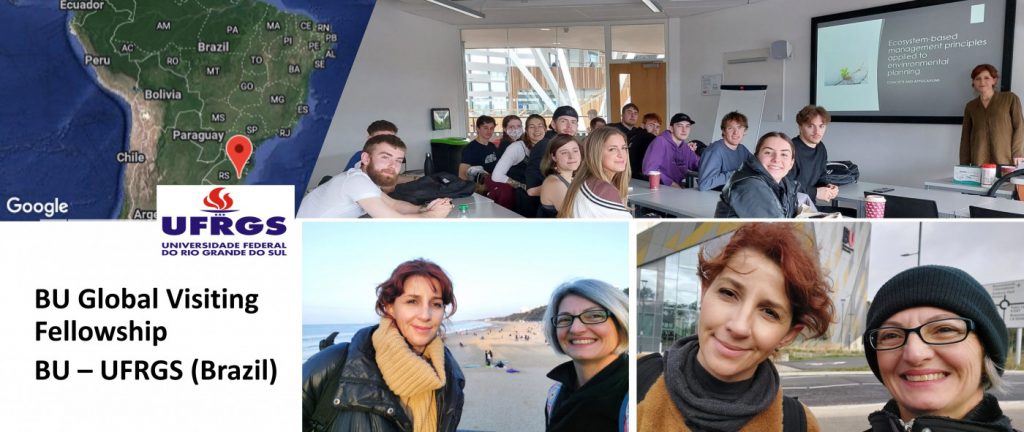It was 23rd March 2020 when we submitted our application to BU’s Global Visiting Fellowship (GVF) scheme. I’m sure you remember this date well! We received the outcome of the submission around mid-May and confirmation of funds in June. The GVF provides funding to facilitate international collaborations with partners in BU’s priority list and each fellowship lasts 3 years. The funds cover costs for the Fellows to visit BU and for modest research costs (find out more here). As you can imagine, our plans halted and had to be modified throughout the pandemic. Differences in the timing of restrictions imposed by the UK and Brazil created further difficulties. Only very recently we were able to actually progress with our planned activities and organise the visit of Dr Tatiana Silva to BU. Here we provide some insights about how we started this collaboration, our activities and how we are progressing.
The Fellow: Tatiana is Associate Professor and Deputy Head of the Institute of Geosciences at the Universidade Federal do Rio Grande do Sul (UFRGS), Porto Alegre, southern Brazil. Her research applies remote sensing and spatial analyses to support ecosystem-based planning ranging from the local scale (e.g. ports) to state-wide mapping and zoning.
BU host: Dr Luciana Esteves is Associate Professor at the department of Life & Environmental Sciences (SciTech). Her research concerns drivers and consequences of coastal change and how ecosystem-based management can be a more sustainable and effective way to reduce coastal vulnerabilities.
Motivation to apply: International collaboration has always been an important part of my work. At BU, I was Global Engagement Leader for my department and, I continue to actively contribute to BU’s global engagement, particularly with Brazil. I have an extensive network in Brazil and I’m always interested in opportunities to continue working with colleagues there.
How this collaboration started: When BU launched the GVF scheme, I knew that two Brazilian universities were in BU’s list of priority partners (USP and UFRGS). I then assessed who in these universities could be a good collaborator and a good fit to the call. I did my PhD at UFRGS and I was interested in re-establishing links. The call encouraged applications from female staff/fellows so I prioritised potential female colleagues from UFRGS with converging research interests and with greater potential for a successful long-term collaboration. In my search, I found out that Tatiana was working at UFRGS and working with ecosystem-based planning and with track record in international collaboration. Further, she had roles that would make her well-placed to develop and consolidate a long-term partnership. Although I knew Tatiana from the time I was an academic in Brazil, we have never worked together but it seemed a very good fit for this call. I decided to send an email and assess her interest. I was very glad when she replied promptly and positively. We started to discuss our common interests and soon agreed on a plan for our proposal. And here we are!
We think our proposal was successful because: we carefully considered all requirements of the call and proposed a plan that attended to these requirements and, at the same time, enabled us to start a collaboration in a new line of research that was of common interest. The plan included: a special session at a conference, workshops, purchase of software (including student licences), training to students, co-supervision of postgraduate students, and publications.
Difficulties: COVID, COVID and COVID! Remote international collaborations are intrinsically difficult due to differences in time zones, academic calendars, teaching schedules, working styles etc. It’s even more so if it’s with someone you have never worked with. During the pandemic, funds were temporarily suspended and there was little we could do. Activities were replanned but a lot of time was lost. The opportunity for Tatiana to come to BU and for us to actually meet in person took 2 years to realise. Now we are progressing well but our funding ends at the end of July and this is a predicament.
Was this worthwhile? Yes, definitely. It would have been so much better and more enjoyable without the challenges brought by the pandemic, but I believe we have formed a partnership that will be long lasting – which is a key aim of the GVF scheme. We have a number of interesting activities to finish, students have expressed interest to go for placements with Tatiana and the MoU has been approved by both BU and UFRGS, so we have a lot to look forward to. We also found out that we can work well together, which is very important.
You can read Tatiana’s blog about her experience and visit to BU here.
Lu Esteves, lesteves@bournemouth.ac.uk

 Focus on Fellowships – Global Visiting Fellowship scheme
Focus on Fellowships – Global Visiting Fellowship scheme










 Beyond Academia: Exploring Career Options for Early Career Researchers – Online Workshop
Beyond Academia: Exploring Career Options for Early Career Researchers – Online Workshop UKCGE Recognised Research Supervision Programme: Deadline Approaching
UKCGE Recognised Research Supervision Programme: Deadline Approaching SPROUT: From Sustainable Research to Sustainable Research Lives
SPROUT: From Sustainable Research to Sustainable Research Lives BRIAN upgrade and new look
BRIAN upgrade and new look Seeing the fruits of your labour in Bangladesh
Seeing the fruits of your labour in Bangladesh ECR Funding Open Call: Research Culture & Community Grant – Apply now
ECR Funding Open Call: Research Culture & Community Grant – Apply now ECR Funding Open Call: Research Culture & Community Grant – Application Deadline Friday 12 December
ECR Funding Open Call: Research Culture & Community Grant – Application Deadline Friday 12 December MSCA Postdoctoral Fellowships 2025 Call
MSCA Postdoctoral Fellowships 2025 Call ERC Advanced Grant 2025 Webinar
ERC Advanced Grant 2025 Webinar Update on UKRO services
Update on UKRO services European research project exploring use of ‘virtual twins’ to better manage metabolic associated fatty liver disease
European research project exploring use of ‘virtual twins’ to better manage metabolic associated fatty liver disease